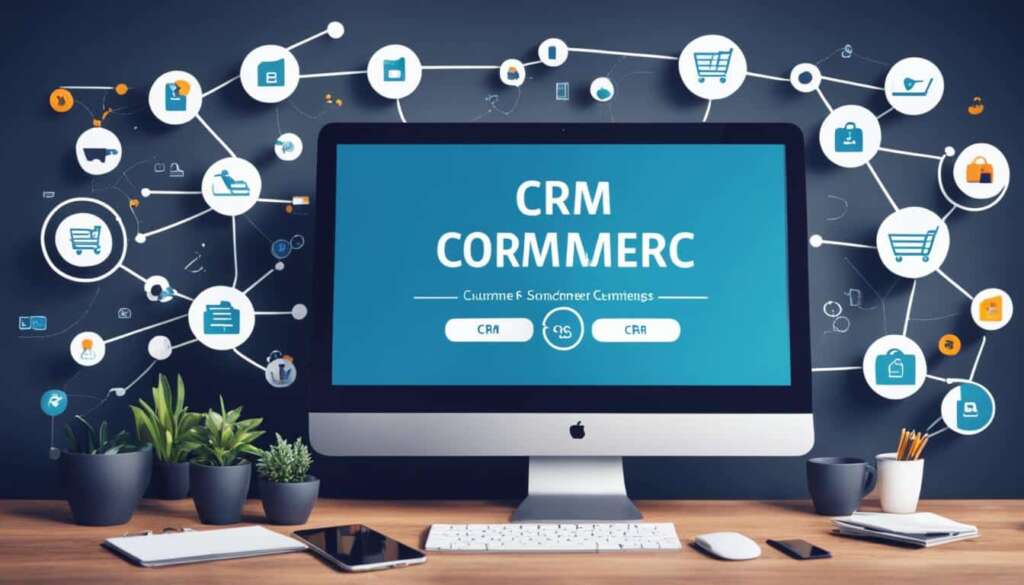Table of Contents
Welcome to our article on e-commerce product manager career insights. In this digital age, the e-commerce industry is thriving, driving the need for skilled professionals who can navigate the complexities of digital retail management. As an e-commerce product manager, you play a crucial role in overseeing online sales operations, optimizing product selection, and ensuring customer satisfaction.
Throughout this article, we will provide you with valuable insights into the role of an e-commerce product manager, offering expert career advice for success in digital retail management. Whether you are considering a career in this field or looking to expand your existing skill set, we have got you covered.
So, let’s dive in and explore the fascinating world of e-commerce product management, where innovation and strategy intersect to propel businesses towards success.
Role Overview of an E-commerce Manager
E-commerce managers play a crucial role in managing the entire e-commerce presence of retail companies. From planning and developing the shop appearance to coordinating with various departments and agencies, these professionals are responsible for ensuring a seamless online shopping experience for customers.
The primary goal of an e-commerce manager is to improve conversion rates and optimize the product range. They analyze sales statistics, identify trends, and implement strategies to enhance sales performance. By closely monitoring key metrics, such as website traffic and customer engagement, e-commerce managers can make data-driven decisions to drive success in the digital retail space.
Working in the retail and business-to-consumer (B2C) industry, e-commerce managers require a diverse skill set to excel in their role. Effective communication, strong teamwork, and adaptability are crucial attributes that enable them to collaborate with various stakeholders, including marketing, design, and IT teams.
Responsibilities of an E-commerce Manager
“As an e-commerce manager, you will:
- Plan and develop the shop appearance to ensure an intuitive and visually appealing user experience.
- Coordinate with departments and agencies to execute marketing campaigns and promotions.
- Manage payments and returns, ensuring smooth transactions and customer satisfaction.
- Analyze sales statistics, identify trends, and implement strategies to optimize the product range.
“
Skills and Background
E-commerce managers require a strong background in business administration, complemented by skills in communication, teamwork, and adaptability. They must possess a deep understanding of the retail industry and stay updated on emerging trends and technologies.
Some essential skills for e-commerce managers include:
- Business acumen: A solid understanding of the retail landscape and consumer behavior.
- Sales and marketing expertise: The ability to develop effective strategies to drive customer engagement and conversion.
- Technical proficiency: Familiarity with e-commerce platforms, web analytics, and digital marketing tools.
- Analytical mindset: The capability to interpret data and derive actionable insights for optimization.
With a comprehensive set of skills and a background in business administration, e-commerce managers are well-equipped to navigate the complexities of the digital retail landscape successfully.
Note: The image above illustrates the role of an e-commerce manager, encompassing responsibilities, skills, and background.
Tasks of an E-commerce Manager
An e-commerce manager plays a crucial role in driving the success of an e-commerce business. Their tasks go beyond just managing sales and include a diverse range of responsibilities that contribute to the overall growth and optimization of the company.
Defining Company Objectives
One of the key tasks of an e-commerce manager is to define company objectives. This involves setting clear and measurable goals that align with the overall business strategy. By defining objectives, e-commerce managers provide a roadmap for success and ensure that all efforts are focused towards achieving these goals.
Sales Optimization
Optimizing sales and conversion rates is another critical task for e-commerce managers. They analyze sales data and stock levels to identify trends and make data-driven decisions to improve sales performance. By implementing effective pricing strategies, product placement techniques, and optimizing the customer shopping experience, e-commerce managers can maximize revenue and profitability.
Promotional Campaigns and Advertising
E-commerce managers are responsible for planning and executing promotional campaigns and advertising efforts. They develop strategies to attract and engage customers, increase brand awareness, and drive sales. This includes managing paid advertising campaigns, social media promotions, email marketing, and other promotional activities.
SEO and SEM Strategies
Implementing search engine optimization (SEO) and search engine marketing (SEM) strategies is crucial for increasing website visibility and driving organic traffic. E-commerce managers work closely with digital marketing teams to optimize website content, improve search engine rankings, and execute pay-per-click (PPC) campaigns. By staying updated with the latest SEO trends and techniques, they ensure that the company’s online presence is maximized.
Managing Returns and Customer Service
Handling returns and providing excellent customer service is an essential task for e-commerce managers. They develop policies and processes to streamline returns, ensuring customer satisfaction and maintaining positive brand reputation. By effectively managing customer queries and concerns, e-commerce managers build trust and loyalty with customers.
Website Evaluation and Technical Advice
E-commerce managers evaluate website design, usability, and performance to identify areas for improvement. They provide technical advice to enhance the user experience and ensure that the website is optimized for conversions. By staying updated with the latest trends and best practices in web design and user experience, e-commerce managers create a seamless and engaging online shopping environment.
“The role of an e-commerce manager is multifaceted, requiring a deep understanding of industry trends, customer behavior, and technical expertise. By effectively managing tasks such as defining company objectives, optimizing sales, planning promotional campaigns, implementing SEO and SEM strategies, managing returns, and providing technical advice, e-commerce managers contribute significantly to the success of an e-commerce business.”
As the e-commerce industry continues to evolve and grow, e-commerce managers play a vital role in driving businesses forward. With their diverse set of tasks and responsibilities, they contribute to the overall success and profitability of e-commerce companies.
Skills Required for an E-commerce Manager
E-commerce managers play a crucial role in the success of online businesses. To excel in this field, e-commerce managers need to possess a diverse set of skills. Here are some of the key skills required to thrive as an e-commerce manager:
- Business Management: E-commerce managers should have a solid understanding of business principles and strategies. They need to be able to analyze market trends, develop competitive pricing strategies, and make data-driven decisions to drive sales and profitability.
- Sales Strategies: E-commerce managers need to develop effective sales strategies to optimize conversion rates and increase revenue. This includes identifying target customer segments, creating compelling product descriptions and sales copy, and implementing upselling and cross-selling techniques.
- Affiliate Marketing: An understanding of affiliate marketing is essential for e-commerce managers. They should be able to identify potential affiliate partners, negotiate partnership agreements, and track and analyze affiliate performance to maximize referral sales.
- SEO: E-commerce managers must have a good understanding of search engine optimization (SEO) techniques. They should be able to conduct keyword research, optimize product pages for search engines, and implement on-page and off-page SEO strategies to improve organic visibility and drive traffic.
- Market Research: E-commerce managers need to stay informed about market trends, customer preferences, and competitor strategies. They should conduct market research to identify emerging opportunities, gather customer insights, and make informed decisions about product assortment and pricing.
- Communication Skills: Strong communication skills are vital for e-commerce managers. They need to collaborate with various departments and agencies, effectively communicate goals and strategies, and coordinate cross-functional teams to ensure smooth operations and achieve business objectives.
- Online Marketing Campaigns: E-commerce managers should have the ability to develop and execute online marketing campaigns. This includes creating targeted advertisements, managing social media presence, and leveraging email marketing to engage customers and drive sales.
Furthermore, e-commerce managers must be adaptable and stay up-to-date with the constantly evolving digital landscape. They should proactively seek opportunities to expand their knowledge and skills, attending industry conferences, participating in webinars, and engaging with online communities to stay ahead of the competition.
In summary, e-commerce managers require a wide range of skills encompassing business management, sales strategies, affiliate marketing, SEO, market research, communication skills, and online marketing campaigns. Developing these skills and staying abreast of industry trends will enable individuals to excel in the dynamic field of e-commerce management.
Education and Background for E-commerce Managers
E-commerce managers play a critical role in the success of online businesses, overseeing various aspects of digital retail management. To excel in this field, a combination of education, practical experience, and relevant background is essential.
E-commerce managers typically possess a background in business management, marketing, communications, or computer science. Their educational foundation equips them with the necessary knowledge to understand consumer behavior, marketing strategies, and business operations. While formal education is advantageous, hands-on experience and continuous learning on the job are equally valuable in cultivating the skills required for e-commerce management.
For aspiring e-commerce managers, Google offers online courses in digital marketing that provide a solid foundation in key concepts and industry practices. These courses cover topics such as search engine optimization (SEO), search engine marketing (SEM), online advertising, and data analytics. Completing these courses can enhance one’s theoretical knowledge and practical skills, making them well-equipped to thrive in the e-commerce industry.
Key Education and Background Considerations for E-commerce Managers:
- A degree in business management provides a comprehensive understanding of organizational dynamics, finance, marketing, and strategic planning. This knowledge is instrumental in managing e-commerce operations and driving business growth.
- A background in marketing equips e-commerce managers with the skills to develop effective marketing campaigns, conduct market research, and analyze consumer trends. This knowledge helps in optimizing product visibility and driving customer engagement.
- Communications skills are essential for e-commerce managers to effectively collaborate with cross-functional teams and communicate the brand’s message to customers. Strong written and verbal communication abilities enable them to craft compelling product descriptions, promotional content, and customer communications.
- A foundation in computer science provides e-commerce managers with a deeper understanding of technology and its impact on online businesses. This knowledge enables them to leverage tools and platforms effectively, make data-driven decisions, and stay ahead of technological advancements in the e-commerce landscape.
By combining theoretical knowledge with practical skills, e-commerce managers gain the expertise needed to navigate the complexities of digital retail management successfully. Whether obtained through formal education, online courses, or on-the-job training, the right education and background set the stage for a fulfilling and prosperous career in e-commerce management.

Summary
E-commerce managers require a diverse skill set and a solid educational foundation to thrive in the dynamic world of digital retail management. Their background in business management, marketing, communications, or computer science equips them with the knowledge and skills necessary to oversee various aspects of e-commerce operations. While formal education is advantageous, practical experience and continuous learning are equally crucial for success in this field. E-commerce managers who stay updated with industry trends, embrace new technologies, and cultivate strong communication and strategic thinking abilities open doors to exciting career opportunities in the ever-growing e-commerce industry.
| Key Education and Background | Relevant Skills and Knowledge |
|---|---|
| Degree in Business Management | Organizational dynamics, finance, marketing, strategic planning |
| Background in Marketing | Marketing campaigns, market research, consumer trends |
| Strong Communications Skills | Collaboration, customer communications, promotional content |
| Foundation in Computer Science | Technology understanding, data-driven decision-making |
Salary Outlook for E-commerce Managers
The salary for e-commerce managers can vary depending on factors such as experience, industry, and company size. Junior e-commerce managers can start with a salary as low as $20,000, while senior managers can earn up to $160,000 per year. Freelance e-commerce managers typically charge an hourly rate of around $72, with the average rate for 2022 being $72/hour. The salary range for e-commerce managers reflects the demand for their skills and the impact they have on an e-commerce business’s success.
E-commerce managers play a crucial role in driving the success of online businesses. They are responsible for managing the entire e-commerce presence, from planning and developing the shop appearance to analyzing sales statistics and optimizing conversion rates. Their expertise directly affects the growth and profitability of e-commerce businesses.
Junior e-commerce managers entering the field may start with a relatively low salary of $20,000. These entry-level professionals are typically new to the role and have limited experience. However, as they gain skills and knowledge, their earning potential increases.
“As an e-commerce manager, I started with a junior position and a humble salary. But with dedication and continuous learning, I was able to climb the career ladder and reach a senior management role with a significantly higher salary.”
– Jane Smith, Senior E-commerce Manager
Senior e-commerce managers, on the other hand, can earn salaries of up to $160,000 per year. These seasoned professionals have extensive experience and a proven track record of driving sales and optimizing online operations. Their expertise is highly valued and rewarded accordingly.
For those who prefer the freedom and flexibility of freelancing, e-commerce managers can charge an hourly rate of around $72. Freelance e-commerce managers work on a project basis, offering their expertise to multiple clients and enjoying the autonomy to choose assignments that align with their interests and skills.
Salary Outlook for E-commerce Managers
Here is a summary of the salary outlook for e-commerce managers:
| Level | Salary |
|---|---|
| Junior E-commerce Manager | Starting from $20,000 per year |
| Average E-commerce Manager | Varies based on experience and industry |
| Senior E-commerce Manager | Up to $160,000 per year |
| Freelance E-commerce Manager | Average rate of $72/hour in 2022 |
The salary range for e-commerce managers reflects the demand for their skills and expertise in the rapidly growing e-commerce industry. As online businesses continue to expand, the importance of e-commerce managers in driving sales and optimizing online operations will only increase. Whether starting as a junior e-commerce manager or aiming for a senior management role, a career in e-commerce management offers both professional growth and financial rewards.
Career Insights for E-commerce Product Managers
The role of an e-commerce product manager offers significant career growth opportunities, as the e-commerce industry continues to expand. E-commerce product managers play a pivotal role in driving the success of online businesses, ensuring that products are effectively presented and marketed to customers. This section provides valuable insights into the career prospects and industry trends for aspiring e-commerce product managers.
Key Growth Opportunities
E-commerce product managers have the opportunity to work on a diverse range of projects, allowing them to gain valuable experience and expand their skill set. They collaborate with various stakeholders, including marketing, design, and engineering teams, to develop and launch successful e-commerce products. By taking ownership of the product lifecycle, from ideation to execution, e-commerce product managers can showcase their leadership abilities and contribute to the growth of the business.
Furthermore, e-commerce product managers can leverage their expertise to explore new avenues within the e-commerce industry. With the expansion of online marketplaces, the demand for innovative digital products and services is on the rise. This presents e-commerce product managers with the opportunity to explore emerging trends, such as mobile commerce, voice commerce, and augmented reality, and develop cutting-edge solutions that drive customer engagement and generate revenue.
Staying Ahead of Industry Trends
In order to succeed as an e-commerce product manager, it is crucial to stay updated with the latest industry trends and technological advancements. Keeping a finger on the pulse of the e-commerce landscape allows product managers to identify opportunities and adapt their strategies accordingly. By staying ahead of the curve, e-commerce product managers can position themselves as industry leaders and bring innovative ideas and solutions to the table.
Attending industry conferences, networking with industry professionals, and participating in online communities dedicated to e-commerce are effective ways to stay up-to-date with industry trends. Additionally, conducting market research and competitor analysis can provide valuable insights into consumer preferences and emerging market niches, enabling e-commerce product managers to make informed decisions and develop products that cater to evolving customer needs.
Continuous Skill Development
E-commerce product managers need to continuously develop their skills to stay competitive in the fast-paced digital retail landscape. Acquiring knowledge and proficiency in areas such as user experience (UX) design, data analysis, project management, and digital marketing can enhance their capabilities and contribute to their success as e-commerce product managers.
Professional development courses, certifications, and workshops offer opportunities to gain new skills and expand existing ones. E-commerce product managers can also benefit from mentorship programs, where they can learn from experienced professionals and gain insights into the industry’s best practices.
Building a Strong Network
Building a strong professional network is essential for long-term success as an e-commerce product manager. Engaging with industry experts, like-minded professionals, and potential collaborators opens doors to new opportunities, knowledge sharing, and career advancement.
Attending industry events, participating in online forums, and joining professional associations are effective ways to connect with others in the e-commerce community. Building relationships with colleagues, mentors, and industry influencers can provide valuable insights, career guidance, and potential collaborations.
Industry Trends and Outlook
The e-commerce industry is continuously evolving, driven by technological advancements, changing consumer preferences, and market dynamics. It is crucial for e-commerce product managers to stay informed about these trends to shape their strategies and remain competitive.
Some notable industry trends that e-commerce product managers should keep an eye on include:
- Personalization: Customizing the online shopping experience to cater to individual customer preferences.
- Mobile Commerce: The increasing popularity of smartphones and the convenience they offer for online shopping.
- Artificial Intelligence: Leveraging AI technologies to enhance product recommendations, customer support, and inventory management.
- Augmented Reality: Integrating AR features to provide virtual shopping experiences and visualize products in real-world settings.
- Voice Commerce: The rise of voice-activated assistants, enabling customers to make purchases through voice commands.
By staying informed about these trends and anticipating future developments, e-commerce product managers can align their strategies and develop innovative products that capture market demand.
Conclusion
E-commerce product management offers a dynamic and rewarding career path within the digital retail industry. Aspiring individuals can thrive in this role by acquiring the necessary skills, gaining practical experience, and staying updated on industry trends. The demand for e-commerce product managers is expected to continue growing as the e-commerce industry expands.
To excel in this exciting field, individuals must possess the right expertise and demonstrate a passion for driving online sales success. As e-commerce continues to revolutionize the retail landscape, the role of e-commerce product managers becomes increasingly critical. By leveraging their knowledge in digital retail management, these professionals can contribute significantly to the success of e-commerce businesses.
With their ability to analyze market trends, optimize product range, and coordinate various stakeholders, e-commerce product managers play a crucial role in the growth and profitability of digital retail companies. By staying adaptable, continuously developing their skills, and building a strong network within the e-commerce community, individuals can carve out a successful and fulfilling career as e-commerce product managers.
FAQ
What is the role of an e-commerce manager?
An e-commerce manager is responsible for managing the entire e-commerce presence of retail companies, including tasks such as planning and developing the shop appearance, coordinating with various departments and agencies, managing payments and returns, and analyzing sales statistics.
What are the main tasks of an e-commerce manager?
The main tasks of an e-commerce manager include defining company objectives, reviewing sales data and stock levels, optimizing sales and conversion rates, analyzing internal data and web analytics, developing pricing strategies, managing returns, planning promotional campaigns and advertising, implementing SEO and SEM strategies, evaluating website design, and providing marketing and technical advice to clients.
What skills are required for an e-commerce manager?
E-commerce managers need a range of skills including business management, sales strategies, affiliate marketing, SEO, market research, communication skills, and the ability to develop and design online marketing campaigns.
What education and background are required to become an e-commerce manager?
While a background in business management, marketing, communications, or computer science is beneficial, learning on the job and gaining practical experience is often the best way to become an e-commerce manager.
What is the salary outlook for e-commerce managers?
The salary for e-commerce managers can vary depending on factors such as experience, industry, and company size. Junior e-commerce managers can start with a salary as low as $20,000, while senior managers can earn up to $160,000 per year. Freelance e-commerce managers typically charge an hourly rate of around $72.
What are the career growth opportunities for e-commerce product managers?
The role of an e-commerce product manager offers significant career growth opportunities, as the e-commerce industry continues to expand. E-commerce product managers can expect to work on a range of projects and collaborate with various stakeholders, including marketing, design, and engineering teams.













